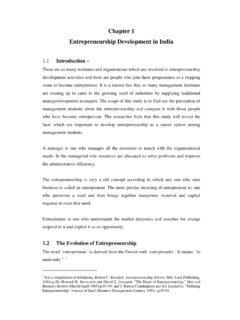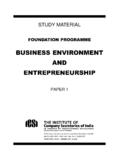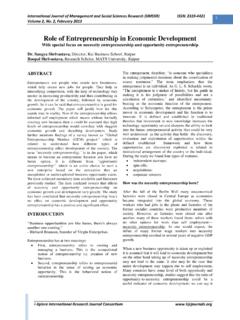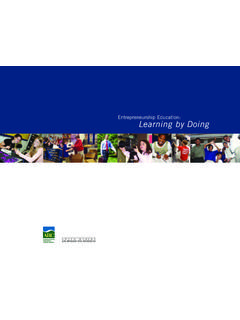Transcription of Disclaimer - OECD
1 Disclaimer Authorised for publication by Sergio Arzeni, Director, Centre for entrepreneurship , SMEs, Tourism and Local Development. This paper should not be reported as representing the official views of the OECD or of its member countries. The opinions expressed and arguments employed are those of the authors. This paper describes preliminary results or research in progress by the author(s) and are published to stimulate discussion on a broad range of issues on which the OECD works. Comments on Papers are welcomed, and may be sent to Center for entrepreneurship , OECD, 2 rue Andr -Pascal, 75775 Paris Cedex 16, France. This document and any map included herein are without prejudice to the status of or sovereignty over any territory, to the delimitation of international frontiers and boundaries and to the name of any territory, city or area.
2 Acknowledgment This document has been prepared by Martin Lack us from Chalmers School of entrepreneurship , under the supervision of Andrea-Rosalinde Hofer and Jonathan Potter, with the help of Joseph Tixier, from the LEED (Local Economic and Employment Development) Division of the OECD (Organisation for Economic Co-operation and Development), with expert comments from the Entrepreneurship360 stakeholder community. Cover visual: Joseph Tixier Martin Lack us, 2015 TABLE OF CONTENTS entrepreneurship IN EDUCATION WHAT, WHY, WHEN, HOW .. 1 introduction .. 6 WHAT IS entrepreneurship IN EDUCATION? .. 7 Terminology of entrepreneurship in education .. 7 Wide and narrow views on 9 Educating about, for and through entrepreneurship .
3 10 Value creation as the common core of entrepreneurial education .. 10 Entrepreneurial competencies .. 12 The debates around entrepreneurial education .. 13 Comparing entrepreneurial education to other pedagogical approaches .. 15 Future answers to the question What is entrepreneurship in education? .. 16 2. WHY IS ENTREPRENEURIAL EDUCATION RELEVANT? .. 17 Stated effects of entrepreneurial education .. 17 Evidenced effects of entrepreneurial education .. 19 Some novel ways to assess the development of entrepreneurial competencies .. 20 Future answers to the question Why is entrepreneurial education relevant? .. 22 3. WHEN TO DO WHAT? .. 22 Four progression models from United Kingdom, Denmark and Sweden .. 23 Towards a unified progression model for entrepreneurial education.
4 24 Future answers to the question When to do what? .. 26 4. HOW TO DO ENTREPRENEURIAL EDUCATION? .. 26 Activities that trigger entrepreneurial competencies .. 26 How learning-by-doing works .. 27 Some tools that can support the value creation process .. 29 Scaling entrepreneurial education .. 32 Organizing interaction with the outside 33 Future answers to the question How to do entrepreneurial education? .. 34 5. CONCLUSIONS .. 35 REFERENCES .. 36 6 introduction 1. The idea of infusing entrepreneurship into education has spurred much enthusiasm in the last few decades. A myriad of effects has been stated to result from this, such as economic growth, job creation and increased societal resilience, but also individual growth, increased school engagement and improved equality.
5 Putting this idea into practice has however posed significant challenges alongside the stated positive effects. Lack of time and resources, teachers fear of commercialism, impeding educational structures, assessment difficulties and lack of definitional clarity are some of the challenges practitioners have encountered when trying to infuse entrepreneurship into education. 2. This report aims to clarify some basic tenets of entrepreneurship in education, focusing on what it is, why it is relevant to society, when it is applied or not and how to do it in practice. The intended audience of this report is practitioners in educational institutions, and the basis of this clarification attempt consists primarily of existing research in the domains of entrepreneurship , education, psychology and philosophy.
6 Where research is scarce the author of this report will attempt to give some guidance based on own conducted research. 3. What we mean when we discuss entrepreneurship in education differs significantly. Some mean that students should be encouraged to start up their own company. This leans on a rather narrow definition of entrepreneurship viewed as starting a business. Others mean that it is not at all about starting new organizations, but that it instead is about making students more creative, opportunity oriented, proactive and innovative, adhering to a wide definition of entrepreneurship relevant to all walks in life. This report takes the stance that a common denominator between these differing approaches is that all students can and should train their ability and willingness to create value for other people.
7 This is at the core of entrepreneurship and is also a competence that all citizens increasingly need to have in today s society, regardless of career choice. Creating new organizations is then viewed as one of many different means for creating value. 4. Why entrepreneurship is relevant to education has so far primarily been viewed from economic points of view. This has worked fairly well for elective courses on higher education level, but is more problematic when infusing entrepreneurship into primary and secondary levels of education for all students. Here, a much less discussed but highly interesting impact that entrepreneurship can have on education is the high levels of student motivation and engagement it can trigger, and also the resulting deep learning.
8 This report will argue that in line with a progression model of when to infuse entrepreneurship into education, the question of what effects to focus on should also be progressively changing over time in the educational system. Students can become highly motivated and engaged by creating value to other people based on the knowledge they acquire, and this can fuel deep learning and illustrate the practical relevancy of the knowledge in question. Those students that pick up strong interest and aptitude for value creation can then continue with elective courses and programs focusing on how to organize value creation processes by building new organizations. Such an approach has far-reaching implications on how to plan, execute and assess entrepreneurship in education, and they will be discussed in this report.
9 7 5. When we should infuse entrepreneurship into education is increasingly clear in theory, but in practice much remains to be done. In theory we should start at an early age with a wide definition of entrepreneurship embedded across the curriculum and relevant to all students, preferably in preschool and primary school. Later in the educational system we should complement with a parallel voluntary and more business-focused approach, applying a more narrow definition of entrepreneurship . In practice however, explicit entrepreneurial activities on primary education levels are rare. And on secondary and tertiary levels most initiatives are business start-up focused, lacking embeddedness into other teaching subjects. In vocational education and training, entrepreneurial activities are frequent in terms of value creation for other people, but they are seldom connected to the entrepreneurship domain and its tools, methods and processes for creating value.
10 6. How to make students more entrepreneurial is probably the most difficult and important question in this domain. Many researchers claim that the only way to make people more entrepreneurial is by applying a learning-by-doing approach. But then the question of learning-by-doing-what needs to be properly answered. There is increasing consensus among researchers that letting students work in interdisciplinary teams and interact with people outside school / university is a particularly powerful way to develop entrepreneurial competencies among students. However, if this kind of experiential learning based activity is to be classified as entrepreneurial, some kind of value needs to be created for the people outside school or university in the process.
















